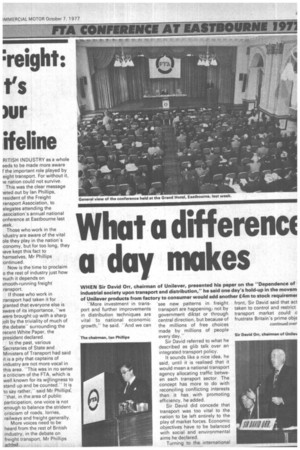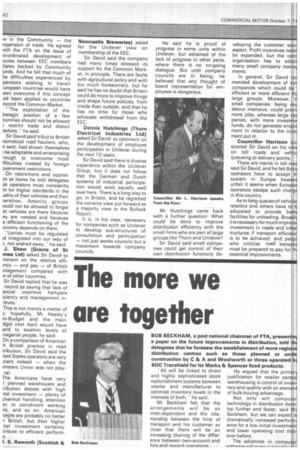What a differena a day makes
Page 43

Page 44

If you've noticed an error in this article please click here to report it so we can fix it.
WHEN Sir David Orr, chairman of Unilever, presented his paper on the "Dependence of • industrial society upon transport and distribution," he said one day's hold-up in the movem. of Unilever products from factory to consumer would add another E4m to stock requiremet "More investment in transport and further improvements in distribution techniques are vital to national economic growth," he said. "And we can
-see new patterns in freight transport are happening,' not by government diktat or through central direction, but because of the millions of free choices made by millions of people every day."
Sir David referred to what he described as glib talk over an integrated transport policy.
It sounds like a nice idea, he said, until it is realised that it would mean a national transport agency allocating traffic between each transport sector. The concept has more to do with reconciling conflicting interests than it has with promoting efficiency, he added.
Sir David did concede that transport was too vital to the nation to be left entirely to the play of market forces. Economic objectives have to be balanced with social and environmental aims he declared.
Turning to the international front, Sir David said that act taken to control and restrict transport market could frustrate Britain's prime obje
ie m the Community — the xpansion of trade. He agreed vith the FTA on the issue of :o-ordinated development of outes between EEC members itates backed by Community unds. And he felt that much of he difficulties experienced by perators wishing to transit :uropean countries would have ,een overcome if this concept ad been applied to countries eyond the Common Market.
The exploitation of the trategic position of a few ountries should not be allowed ) restrict trade and distort larkets,' he said.
Sir David paid tribut to British iternatioal road hauliers, who, e said, had shown themselves
be adaptable and enterprising -lough to overcome most ifficulties created by foreign Dvernment restrictions.
On restrictions and opposi)11 at home he told delegates at operators must constantly m for higher standards in the Jality of their vehicles and their )eration. Amenity groups iould not be allowed to forget at vehicles are there because ey are needed and because e efficient functioning of the onomy depends on them. "Lorries must be regulated integrated into our way of
not wished away,he said. J. Shaw (Grants of St imes Ltd) asked Sir David to mment on the relative effiincy — and pay — of British inagement compared with 3t of other countries. •
Sir David replied that he was record as saying that lack of ancial incentive hampers iciency and management initives.
This is not merely a matter of y; hopefully, Mr Healey's ni-Budget and the main dget next April would have lard to taxation levels of nagerial people, he said. On a comparison of American h British practice in road tribution, Sir David said the ited States operators are very cient indeed — when the imsters Union was not playup.
The Americans have very I planned warehouses and :ribution depots with high .ital investment — plenty of chanical handling, attention 3n to convenient working )ls, and so on. American cepts are probably no better 1 British, but their higher ital investment certainly tribute to efficient performe,
I. S. Raworth (Scottish & Newcastle Breweries) asked for the Unilever view on membership of the EEC.
Sir David said the company had many times stressed its support for the Common Market, in principle. There are faults with agricultural policy and with too much bureaucracy, but he said he has no doubt that Britain could do more to improve things and shape future policies, from inside than outside, and that he has no time for those who advocate withdrawal from the EEC.
Dennis Hutchings (Thorn Electrical Industries Ltd) asked Sir David to comment on the development of employee participation in Unilever during the next 10 years.
Sir David said there is diverse experience within the Unilever Group, but it does not follow that the German and Dutch systems of industrial participation would work equally well over here. There is a long way to go, in Britain, and he regretted the extreme view put forward as a majority view in the Bullock Report.
It is, in his view, necessary for companies such as Unilever to develop sub-structures of consultation and participation — not just works councils but a movement towards company CO uncils. He said he is proud of progress in some units within Unilever, but ashamed of the lack of progress in other parts, where there is no on-going dialogue. But until company councils are in being, he believed that any thought of board representation for employees is dangerous.
Mr Hutchings came back with a further question: What could be done to improve distribution efficiency with the small firms who are part of large groups like Thorn and Unilever?
Sir David said small companies could get control of their own distribution functions de
veloping the customer servi aspect. Profit incentives need be expanded, but the cent organisation has to educe many small company manac ments.
In general, Sir David col mended development of sm. companies which could be efficient or more efficient thi large groups. Moreover, ti small companies,' being mo labour intensive, could provii more jobs, whereas large cor panics, with more investme funds, do not generate emplo ment in relation to the inve! ment put in.
Councillor Harrison qul stioned Sir David on his viev on toll roads and vehicl queueing at delivery points.
There are merits in toll roac said Sir David, and he felt Britit operators have to accept tisystem in Europe howevE unfair it seems when Europea operators escape such chargE in this country.
As to long queues of vehicle: retailers and others have to educated to provide bette facilities for unloading. Broadl) it is necessary for much improvel investment in roads and infra! tructures if transport efficienc is to be achieved, and peopl who criticise road transom must be prepared to pay for th essential improvements.












































































































